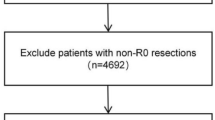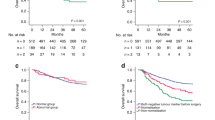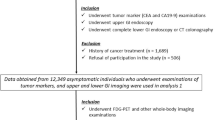Abstract
The new proliferation marker, tissue polypeptide-specific antigen (TPS), representing the specific epitope M3 of tissue polypeptide antigen, and three conventional biochemical markers, CEA, CA 19-9 and CA-195, were analysed in 69 patients with advanced gastrointestinal tumours. The aim of our study was to assess the clinical relevance of these markers and to determine whether their use in monitoring the course of the disease can reduce the need for serial imaging procedures. At baseline, pathologically elevated TPS levels occurred in 90% of patients. CEA was elevated in 73%, CA 19-9 in 59% and CA-195 in 68%. With a detection rate of > 90% in both advanced colorectal (n = 37) and pancreatic cancer (n = 20), and of 75% in gastric cancer (n = 12), TPS was the most sensitive marker in all three tumour types included in this analysis. Serial evaluations of TPS and other biochemical markers were available in 39 patients undergoing palliative systemic chemotherapy. Treatment with a fluorouracil-based regimen resulted in a partial response in 5/27 patients with colorectal cancer, whereas 2/12 patients with pancreatic cancer responded to therapy with a high-dose epirubicin combination regimen. All other patients had disease stabilisation or suffered from progressive disease. When compared with the results of serial CT scanning, the TPS correlated best with the course of the disease, the positive predictive value being 75% for a partial response, 96% for stable disease and partial response combined and 100% for progressive disease. The corresponding values for CEA were 50%, 81% and 62% and were similar to those for CA 19-9 and CA-195. In summary, TPS seems to represent a sensitive, clinically relevant and specific marker of proliferative activity in gastrointestinal cancer. According to our preliminary results in colorectal and pancreatic cancer, TPS may be considered as the primary means of monitoring treatment, and imaging reduced to confirm the response.
This is a preview of subscription content, access via your institution
Access options
Subscribe to this journal
Receive 24 print issues and online access
$259.00 per year
only $10.79 per issue
Buy this article
- Purchase on Springer Link
- Instant access to full article PDF
Prices may be subject to local taxes which are calculated during checkout
Similar content being viewed by others
Author information
Authors and Affiliations
Rights and permissions
About this article
Cite this article
Kornek, G., Schenk, T., Raderer, M. et al. Tissue polypeptide-specific antigen (TPS) in monitoring palliative treatment response of patients with gastrointestinal tumours. Br J Cancer 71, 182–185 (1995). https://doi.org/10.1038/bjc.1995.37
Issue Date:
DOI: https://doi.org/10.1038/bjc.1995.37
This article is cited by
-
The Association of Serum Carcinoembryonic Antigen, Carbohydrate Antigen 19-9, Thymidine Kinase, and Tissue Polypeptide Specific Antigen with Outcomes of Patients with Metastatic Colorectal Cancer Treated with Bevacizumab: a Retrospective Study
Targeted Oncology (2015)
-
Tissue polypeptide specific antigen in the post therapeutic evaluation of patients with ovarian and colorectal cancer
Indian Journal of Clinical Biochemistry (2003)



